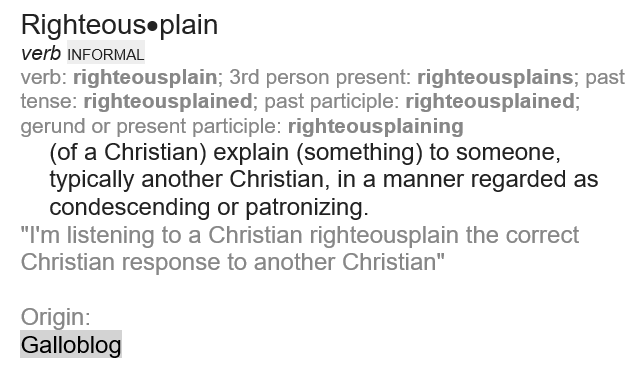There is a trend in the Christian community that drives me bonkers. It can be applied to an infinite number of ways, but it has the same logic structure.
- I am a Christian.
- I have thoughts.
- Therefore, my thoughts are Christian Thoughts.
Note that the implicit extension of point 3 is that if you don’t agree with said thoughts, you’re not Christian. Or, at the least, you’re not thinking Christian thoughts. We’ve seen this time and time again with all sorts of issues. Whether it be the issue of suffering, immigration policies, war, poverty, Kanye West – just wait a day or two, and you will see a flood of articles written by pastors, music artists, and devo debbies who proclaim that they have searched the scriptures and come away unequivocally with what the correct Christian Response should be. This would all be well and good, if there weren’t an equal number of articles from different camps of Christians claiming they have the real insight into how the entire kingdom of God should respond to a particular issue. They all are, in effect, righteousplaining.

This is where the chaos and confusion lies. People from all sorts of different nations, cultures, political ideologies, family structures, moral upbringings, intellectual strengths, and personalities are drawn to the character of Jesus. They make a decision to follow him, and usually get involved in a local church of like-minded people. They talk about their faith with those people, and how it influences how they see the world. Then, they begin to see these opinions and views as representative of Christianity. Then they feel bold and brave enough to righteousplain the Christian Response. Then Christians from other backgrounds get offended and outraged, because their faith is being represented and applied in a way that is foreign and offensive to them.
It’s a tricky thing, because our faith has very bold, well-defined tenets (e.g. love your neighbor) that demand action. But, different people have very different ideas about what those tenets look like IRL. For example, one camp might say “I love my children, so I would never strike them because that is a violent, aggressive act.” A different camp may say “I love my children, and if I see them tottering towards something dangerous I will smack the crap out of them to keep them from harm.” Both of these groups have heard and received the concept of love, but they have different ways of applying it.
So, in light of this, I advise against public proclamations that your response to the societal problem du jour is The Christian Response. Obviously, you are free to explain how your Christian faith motivated your current position, but I urge you against concluding that opponents are workers of the devil. In some issues, they just might be, but in some issues your opponents may simply be the tricep to your bicep in the body of Christ.
Let’s leave righteousplaining to Jesus! Woo!
— EDITORIAL NOTES —
My sister wrote a post that was similar in nature – check it out! WWJD: Who Would Jesus Diss

LikeLiked by 1 person
One of the reasons I love Christian Doctrine is that don’t have to invent anything because it must reflect JUST TRUTH.
LikeLiked by 1 person
Si!
LikeLiked by 1 person
Sim!
LikeLiked by 1 person